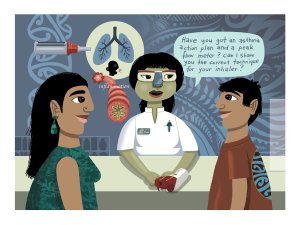Academic pharmacist Nataly Martini discusses the medical management of asthma in adults and adolescents, which has evolved to prioritise early anti-inflammatory treatment. She also explains how to improve patient outcomes by proactively identifying poor asthma control and supporting equitable access to education and treatment
Needle Exchange Programme doubles its economic return
Needle Exchange Programme doubles its economic return
New research shows that the New Zealand Needle Exchange Programme (NZNEP) has doubled its economic return to our public health system over the last 20 years.
The programme cost $5.88 million to run in 2021. Without the programme, our public health system could have expected costs in 2021 of $39.9 million to treat viral blood-borne diseases such as HIV or hepatitis B and C and, injecting related injuries
This equates to $6.79 in benefits for every dollar spent on the programme.
“Not only are we directly reducing harm to people who inject drugs (PWID), and in some cases saving their lives, but we are also improving the health and wellbeing of PWID and reducing the incidence of HIV and hepatitis in the community. New Zealand’s HIV rate amongst people who inject drugs is one of the lowest in the world,” says Philippa Jones, National Operations Manager of NZNEP.
“This new research clearly shows that we are providing one of New Zealand’s most successful public health programmes. We are well and truly punching above our weight.
“In the time we have been operating, there have been dramatic developments in treatment for HIV and hepatitis. Modern treatments for hepatitis C are shorter and much more effective. However, they are significantly more expensive than previous treatments and these costs are paid for by all of us as taxpayers,” she says.
The new data are part of a report commissioned by the NZNEP and undertaken by interns in the Department of Economics and Finance at the University of Canterbury.
It follows 2002 research, which identified savings of $3.35 for every $1 spent on the programme. The increase since 2002 is mostly likely a result of an increase in the New Zealand population and resulting increased prevalence of hepatitis B and C in New Zealand, changing drug use patterns and the higher cost of newer, more effective, medical treatments.
“The facts are clear: we provide value to our clients and to the whole community. Our programme is even more relevant than it was 20 years ago,” says Philippa Jones.
NZNEP opened its doors in 1988 to supply sterile needles and syringes for people who inject legal or illegal drugs, in response to the threat of HIV/AIDS, whereas today’s focus is more on hepatitis C. As well as supplying sterile injecting and harm reduction equipment for an estimated 8,000 – 15,500 people on an annual basis, NZNEP safely collects and disposes of used equipment, and provides education and support services for people who use drugs.
New Zealand was the first country in the world to introduce a national, government-funded needle exchange programme, which was originally operated by several trusts – six of which still exist and now provide services across New Zealand.
Thirty-four years later, the service dispenses needles and syringes all around the country through 20 dedicated needle exchanges, two mobile services, 197 pharmacy partners and an online store - as well as offering hepatitis C testing, harm reduction support and advice to clients.
Many of its clients are unwilling to seek support from normal healthcare services because they are using illegal drugs or because of real or perceived stigma from health workers. They are using a range of stimulants, opioids and steroids.
“People who inject drugs can be high functioning members of our community – they might be your lawyer, your personal trainer, one of your work colleagues or the person you sit next to on the bus. Regardless of who they are, they receive our support, with no questions asked,” says Philippa Jones.
The University of Canterbury research highlights NZNEP’s role in preventing future harm, and calculates that by 2026 it could have prevented 2,600 people from contracting Hepatitis C.
“There are very clear benefits to the wider community from our programme. Not only do we offer harm reduction advice and access to health and social support for our clients, but there are also clear health economic outcomes which benefit the whole community,” says Philippa Jones.
Programme benefits highlighted in the research include:
- People who inject drugs are five times more likely to seek treatment and rehabilitation if they are using a needle and syringe programme.
- NZNEP encourages the use of sterile, unused needles and syringes - rather than sharing or reusing equipment, which increases the risk of infection and skin and soft tissue infections.
- Encouraging people who inject drugs to get tested for HIV or hepatitis C means treatment can start sooner – before the disease progresses, and before others are infected.
- Early diagnosis and treatment saves costs on treating more advanced, serious medical conditions.
- NZNEP provides overdose awareness and prevention education and where available, access to Naloxone – a drug which counters opioid overdose and reduces the risk of an overdose being fatal.
- The programme also provides people who use drugs with education on a wide range of drug-related issues.
About the New Zealand Needle Exchange Programme
- The programme distributes 3.9 million sterile needles each year through a national network of dedicated outlets stretching from Whāngarei to Invercargill and a comprehensive network of nationwide pharmacies. It also collects and safely disposes of equipment that has been used for injecting drugs.
- The programme is predominantly funded by the Ministry of Health, with district health boards providing funding for hepatitis C services.
- The NZNEP is a peer-based programme, the majority of staff have lived experience of injecting drugs. The peer-based model of service delivery improves outcomes for people who use the service and is a crucial factor in the success of the NZNEP.





